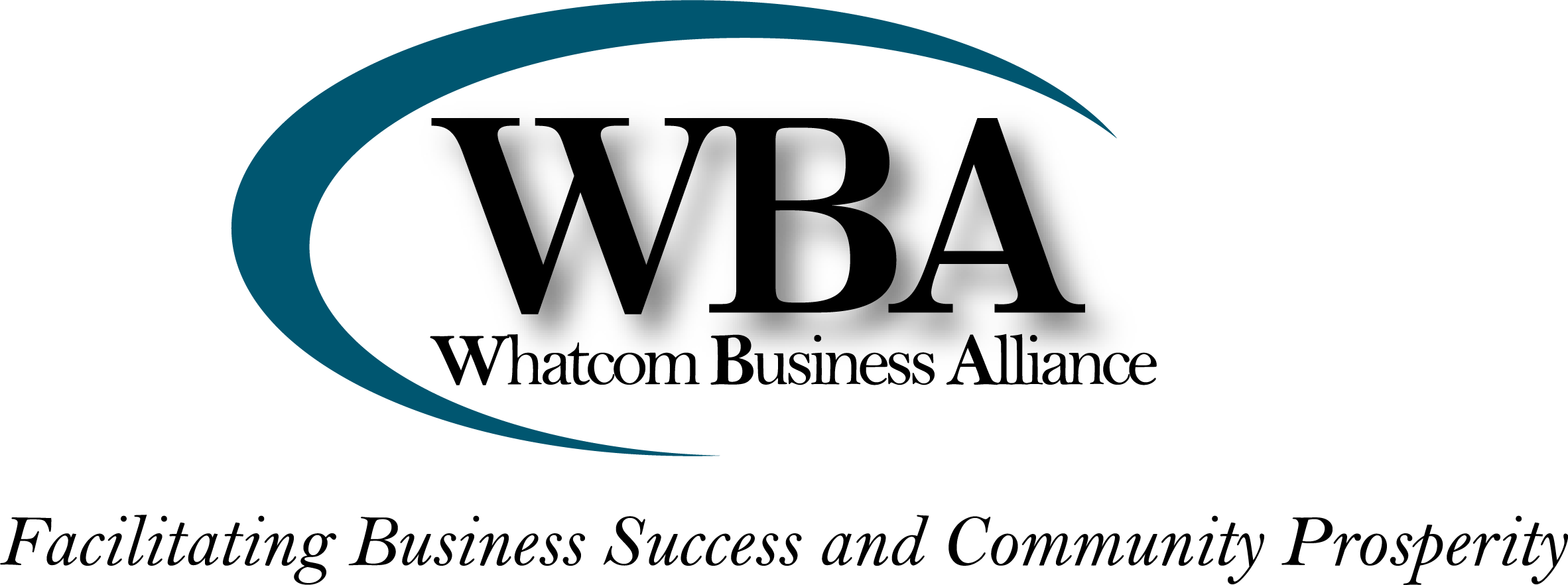Local businesses stepping up together to make a difference
originally published Jan 2019–

The Whatcom Business Alliance (WBA) recently launched its Step Up for Business Advocacy Campaign – or “Step Up,” as it has become known. “Step Up is the answer to numerous requests and long Board [of Directors] conversations about how to substantively improve the business climate in Whatcom County,” WBA President Tony Larson said.
The Step Up Campaign utilizes resources from the business community for local business and economic research, education, and business advocacy.
 At the WBA kick-off event last September, local businesses of all sizes were challenged to make a regular monthly contribution to the Step Up efforts. “It doesn’t matter whether you’re a small local business struggling to meet the day-to-day operational demands, or a larger company taking it to the next level,” Larson said. “The WBA Step Up program is designed to pay attention to the issues that impact your business, and that you don’t have time for.”
At the WBA kick-off event last September, local businesses of all sizes were challenged to make a regular monthly contribution to the Step Up efforts. “It doesn’t matter whether you’re a small local business struggling to meet the day-to-day operational demands, or a larger company taking it to the next level,” Larson said. “The WBA Step Up program is designed to pay attention to the issues that impact your business, and that you don’t have time for.”
According to Larson, the board led campaign came about as a result of feedback from more and more WBA member businesses concerned they were unable to keep up with the increasing number of policy issues that were negatively impacting their businesses.
To be successful, business owners must focus their time on their customers, employees and operations. As part of the campaign, the WBA will identify problem issues on behalf of their members and give business owners advance opportunity to engage before the enactment of policies that impact them.
“Unfortunately, Whatcom County has developed a reputation as a place where employer mandates have become the norm, and where it is very difficult to get new and expansion projects permitted,” Larson said. “Some projects deserve extra scrutiny for sure, and we support that.
“But we’ve hit a tipping point where investments that most would consider the sweet spot for local economic development might not even be considered because of excessive time and permitting costs associated with the effort.”
Proposed employer mandates have concerned many local businesses of all sizes, as well. During 2015 the WBA received calls from many concerned small businesses regarding an ordinance proposed by the Bellingham City Council. It focused on mandatory sick and safe leave for businesses either located or doing business in the City of Bellingham.
“This would have been particularly onerous on small businesses, but would have added several levels of compliance issues for companies already offering benefits that exceeded the regulatory requirements,” Larson said.
In the end the WBA mobilized a group of business stakeholders who clearly voiced their concerns to the Bellingham City Council. The final ordinance was not passed. Unions later funded a statewide ballot referendum that included mandatory sick and safe leave, along with phasing-in minimum wage increases (read Erin Shannon’s column on page 68). It was passed by voters at the State level in the November election and goes into effect in January.
Jane Carten, CEO of Saturna Capital and chair of the WBA Board of Directors, said: “The WBA board believes we can support smart regulation and environmental protection while still focusing on growing our community prosperity and family wage job opportunities. But there needs to be a balanced approach in that conversation. The business community can ‘step up’ and provide that balance.”
One way the WBA brings balance to the conversation is by commissioning unbiased research and sharing that research with the community and with policy makers. The WBA has a close working relationship with Western Washington University’s Center for Economic and Business Research (CEBR). The WBA commissioned the CEBR along with the University of Washington to produce an Economic Impact Study on Cherry Point.
The WBA will continue looking at the overall impact of other key industries to Whatcom County through the Step Up campaign.
In their meeting Aug. 9, 2016, the Whatcom County Council instated an “emergency ordinance” that imposed a moratorium on the acceptance and processing of applications and permits for new or expanded facilities in the Cherry Point urban growth area (UGA). The goal was to ban the shipment of unrefined fossil fuels not processed at Cherry Point.
Larson said this action and its unintended consequences must balance with the significant positive impact that Cherry Point industry has on our community. The Economic Impact Study determined that in addition to providing 10,000-plus family wage jobs, Cherry Point employers contribute more than $200 million to the local tax base, which supports education and public safety throughout our entire community.
The Whatcom County Council is working on an amendment to the Cherry Point UGA section of the County Comprehensive Plan that includes new language making the moratorium permanent.
Through the Step Up campaign the WBA has organized a group of Cherry Point stakeholders to share publicly their concerns about the proposed policy. Additionally the WBA submitted its own collaborative amendment to the Council striving to reach a balanced compromise. The Council is expected to take that up in early 2017.
“Education is the key to the success of the Step Up campaign,” Board member Tom Kenney said. Washington Federal was an early supporter of Step Up and a leading sponsor for the kickoff event.
“Why is Washington Federal sponsoring the WBA Step Up campaign?” Kenney said at the event. “Pretty simple – because we believe it is too important not to do so. Unfortunately, even with their (the Council’s) perceived good intentions, when implemented the actions can have a detrimental impact on our shared goal of balancing environmental protection and creating greater community prosperity.
“Education can help bring people together to better understand the trade-offs of various initiatives proposed by our local governing bodies. Important decisions should be made based on facts, not simply good intentions.”
Hart Hodges, the director of Western’s Center for Economic and Business Research, agreed: “With the analysis of the data we collect, we want to answer the “Now what?” and “So what?” questions. Data isn’t very helpful until you understand its context and find a meaningful message.”
During 2016 a group of concerned business owners in eastern Whatcom County became aware of what they called “unnecessary regulatory overreach.” It centered on Critical Areas Regulations that attempted to restrict future permits as a result of an eruption of Mt. Baker – a highly unlikely event, estimated by scientists as a 6,000-14,000 year event.
Any business in the “LAHAR Inundation Zone” – which essentially runs down the Nooksack River from Mt. Baker to the mouth of Bellingham Bay – would fall subject to building restrictions. Organizations that serve more than 100 people would have been declared non-conforming.
This would have included existing businesses, Bible camps, churches, grocery stores, and more, entities that have operated for years. The proposed legislation would have tied their hands on any expansion plans or possibilities.
Concerned community members contacted the WBA to ask for advice and assistance on how to engage their community and make their concerns known to the County Council.
As part of Step Up, the WBA organized a town hall meeting at Kendall Elementary School and worked with local businesses to develop a strategy to bring common sense to public policy. The group then attended the Council meeting, spoke up, and convinced the lawmakers that the policy was inappropriate. The amended language in the proposal to accommodate the concerned citizens.
Had the WBA not intervened, this action would have negatively impacted hundreds of businesses, many of them even unaware of the threat. Derek Parris, the manager for Mt. Baker Bible Camp, expressed his appreciation to the WBA: “Today our community, once again, has the opportunity to grow and invest in our homes and businesses. Thank you [WBA] for being on point!”
A resonant theme of Step Up is that successful local business supports a vibrant and giving community. The businesses that have stepped up to support the advocacy campaign want to assure the community that there are actual people behind these corporations.
“At the end of the day the success or failure of our businesses translates to the livelihood of our employees and their families,” Jane Carten said. “We are business owners, but we are also citizens of Whatcom County who pay taxes, worry about our school districts, public safety, housing prices, and the quality of life we all share in Whatcom County.
“Through this program, we are encouraging the business community to Step Up and become part of the solution.”
The WBA actively works to grow the participation in the Step Up program. Any business or individual can participate. “We believe there is strength in numbers and that when the business community Steps Up together to engage on issues of importance, we can make a positive impact on the business climate and quality of life in Whatcom County,” Larson said.
“We want to ensure that our local governmental bodies work together in the best interest of all of the people – not just a vocal, well-funded few.”
Information on how to join the Step Up campaign is available on the WBA website:
whatcombusinessalliance.com
